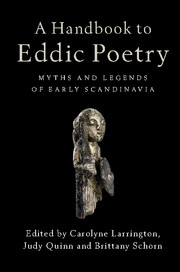Book contents
- Frontmatter
- Contents
- List of illustrations
- List of contributors
- Translations and abbreviations of the titles of eddic poems
- Introduction
- 1 The transmission and preservation of eddic poetry
- 2 Traditions of eddic scholarship
- 3 The editing of eddic poetry
- 4 The dating of eddic poetry
- 5 Eddic performance and eddic audiences
- 6 Eddic poetry and mythology
- 7 Eddic poetry and the religion of pre-Christian Scandinavia
- 8 Eddic poetry and heroic legend
- 9 Place names in eddic poetry
- 10 Eddic poetry and the imagery of stone monuments
- 11 Eddic poetry and archaeology
- 12 Eddic modes and genres
- 13 Eddic metres
- 14 Eddic style
- 15 Kennings and other forms of figurative language in eddic poetry
- 16 Alliterative lexical collocations in eddic poetry
- 17 The representation of gender in eddic poetry
- 18 The reception of eddic poetry
- Consolidated bibliography
- Index
11 - Eddic poetry and archaeology
Published online by Cambridge University Press: 05 August 2016
- Frontmatter
- Contents
- List of illustrations
- List of contributors
- Translations and abbreviations of the titles of eddic poems
- Introduction
- 1 The transmission and preservation of eddic poetry
- 2 Traditions of eddic scholarship
- 3 The editing of eddic poetry
- 4 The dating of eddic poetry
- 5 Eddic performance and eddic audiences
- 6 Eddic poetry and mythology
- 7 Eddic poetry and the religion of pre-Christian Scandinavia
- 8 Eddic poetry and heroic legend
- 9 Place names in eddic poetry
- 10 Eddic poetry and the imagery of stone monuments
- 11 Eddic poetry and archaeology
- 12 Eddic modes and genres
- 13 Eddic metres
- 14 Eddic style
- 15 Kennings and other forms of figurative language in eddic poetry
- 16 Alliterative lexical collocations in eddic poetry
- 17 The representation of gender in eddic poetry
- 18 The reception of eddic poetry
- Consolidated bibliography
- Index
Summary
Recent years have seen a welcome growth in scholarship discussing and exploring the scope for combining expertise in archaeology with expertise in the study of literature. In the case of Old Norse literature, in particular eddic poetry, renewed interest in the archaeology of ritual and religion has directed attention to mythological sources, both in the eddic corpus and Snorra Edda. A corollary of that topic-directed approach is that consideration of how informed literary criticism and a knowledge and understanding of material culture can be integrated has not been as thoroughly reflexive as it could have been. Less has been done to define the interdisciplinary relationship at a primary, theoretical level (cf. Andrén 1998; Moreland 2001; Hines 2004). To make this observation is not to suggest that principles and tenets which are clear and straightforward have naїvely been overlooked. Nor should there be any objection to the proposition that a more general theory of ‘Archaeology and Literature’ may best be derived, gradually, from pioneering empirical studies.
In respect of the extant texts and the archaeological evidence alike, the analysis and reading of the primary material is often a complex challenge – as well as being stimulating and rewarding. Ideally, we might hope that information from one field will clarify or even resolve problems in the other. Unfortunately, where any interpretations, however expert, must be inferential and usually counted as probabilities at best, if not openly speculative, the comparison and combination of two or more such perspectives is likely to lead to a compounding of the level of uncertainty. This makes it all the more vital to think carefully about what might be achieved by a cross-disciplinary endeavour; what the most practical and useful objectives are; and, methodologically, what is required to achieve those. That is much more than can be fully covered in one short chapter, but it is nonetheless hoped that the following discussion will help us along an informative and productive path.
One of the more obvious and familiar approaches to the correlation of archaeology and literature is to consult the archaeological record to assess to what extent (if any) literary texts portray materially realistic contexts.
- Type
- Chapter
- Information
- A Handbook to Eddic PoetryMyths and Legends of Early Scandinavia, pp. 212 - 230Publisher: Cambridge University PressPrint publication year: 2016
- 3
- Cited by



